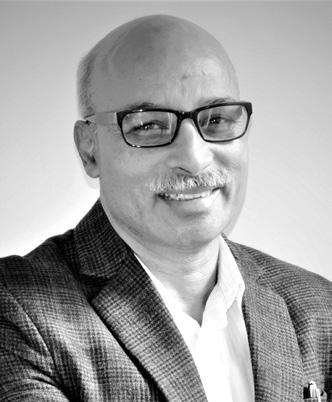
2 minute read
Bedside table Earthquake engineering specialist Jitendra Bothara FEngNZ talks about his reading choices.
Bedside table
Jitendra Bothara FEngNZ CPEng IntPE(NZ) has three decades of experience in earthquake engineering, disaster risk management, post-earthquake response, and research. He’s worked across nine major earthquakes and was heavily involved in the 2005 Kashmir (Pakistan), 2011 Christchurch and 2015 Gorkha (Nepal) earthquake rebuilds. He has been an engineering consultant to private building and portfolio owners, and provided advisory services to various governments, the United Nations Development Programme, Asian Development Bank and World Bank. Jitendra is an ardent believer in identifying strong linkages between social and seismic engineering, and linking traditional knowledge with modern knowledge for seismic safety. He has twice been part of a group awarded the FultonDowner Gold Medal, including in 2022.
Advertisement
What’s on your bedside table?
A vintage lamp, some books on public health and philosophy, headphones and my phone.
Let’s focus on those books – why did you choose them?
I like diversity in my reading list. I read about public health as it gives me insights into how the medical field reaches even the most underprivileged populations in inaccessible areas to mitigate the impacts of pandemics and improve general health. I see the same could be applied for improving seismic safety. Philosophy helps me gain insights into human values and beliefs that guide their behaviour. An incredibly important aspect of disaster risk mitigation is understanding people’s perception of risk, safety and acceptance of solutions.
How do they help you in your role?
Technical reading keeps me updated on research and developments and allows me to learn new skills. The study of philosophy helps me understand the human perspective; culture helps me widen my perspective and address differences in diverse cultural settings. All these assist me to be a better engineer and serve people in more human-centric ways. People’s right to good health is universally recognised, yet we do not consider safety from disasters as a basic human right. Public health ensures that even the most marginalised, disadvantaged and vulnerable populations receive adequate and equitable healthcare. Why should we not aim for the same in disaster risk reduction?
Jitendra Bothara FEngNZ CPEng IntPE(NZ)
Role: Director, Resipro International Engineering Limited Based in: Christchurch Education: Bachelor of Engineering, Tribhuvan University, Nepal, 1989; Master of Engineering, University of Canterbury, 2004
Which group of engineering professionals are these books most helpful for?
All engineering professionals should expose themselves to reading material from a wide range of topics to expand and diversify their perspective. It helps greatly with being able to think outside of the box, improves problem-solving abilities and the capacity to deal with differences.
What is the top book you would recommend to other engineers?
Big Ideas: 100 Wonders of New Zealand Engineering by Matthew Wright presents the fascinating history of the development of engineering in New Zealand.









